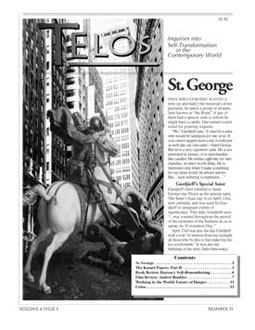|
The Gurdjieff Journal
Back Issue - #13 Volume 4 Issue 1

|
St. George
|
The significance for Gurdjieff of Saint George-the-Victor is not often referred to, though he spoke of him as his "special saint."
Gurdjieff used the saint's feast day of April 23, new calendar, to designate events of significance. "This date, Gurdjieff says,
"...was counted throughout the period of the existence of the Institute as, so to speak, its 'Coronation Day.'"
April 23rd was also the day Gurdjieff took a vow "to remove from my eyesight all those who by this or that make my life too
comfortable." It was also the birthdate of his wife, Julia Ostrowska.
In his book Herald of Coming Good, Gurdjieff announces April 23 as the "beginning of a solemn laying" of the foundation stone
of the new Study House—whose significance, he says, is to be regarded as the "heart of all my activity for the good of my neighbours...."
In the Third Series, the most esoteric of the three books that make up his Legominism, All and Everything, Gurdjieff
makes many allusions to St. George.
|
|
The Kanari Papers
Part II
|
Solita Solano's notes of meetings with Mr. Gurdjieff 1935–39. From the forthcoming book Ladies of The Rope.
Nov. 24
We now go to lunch every day in his apartment. He cooks the food himself and we each put 15 francs in the kitchen box (except Miss Gordon)
and Katie washes the dishes. He calls her "kitchen boy"—"I like such kitchen boy, he not make me nervous." I set the table and wait on him.
Nov. 25
Had luncheon alone with him. He said, "Exercise I gave you is to instill in you a new kind of data you will need for what is to come later."
He gave me the Good and Evil chapter to read—first to myself, then to the others, then to read again alone. I asked him was it true
that once man had had a tail in which was the continuation of denying brain? (I had thought of this in the night.) He said yes.
|
|
Book Review:
Fourth Way Reinterpretation or Distortion?Self-Remembering
by Robert Earl Burton
|
The central idea and practice of the ancient teaching of The Fourth Way is self-remembering, yet in his published writings Gurdjieff
rarely refers to it. Only twice in his First Series, for example, is it mentioned. Ouspensky's In Search of the Miraculous
gives only a preliminary explanation. Now Robert Earl Burton, self-appointed founder and spiritual leader of The Fellowship of Friends,
devotes an entire book to the subject. Given the decisiveness of Mr. Burton's title—Self-Remembering—and its 216-page length,
a reader might be justified in expecting a detailed and knowledgeable exploration of the special state of self-remembering. Not only is
this lacking, but Burton's ideas are derivative and show no real understanding of the Work.
|
|
Film Review:
Andrei Roublev
|
Andrei Tarkovsky's three-hour epic, Andrei Roublev, is a special film in which many principles of the Work are made apparent through
plot, character development, and cinematography.
The overwhelming theme is suffering. Everyone in the film suffers, but their suffering is unconscious. With the help of his teacher, Roublev
uses conscious suffering to transmute his impressions, leading him to create an objective art.
|
|
Conscience
|
Pertinent quotes from Gurdjieff.
|
|
Working in the World:
The Future of Danger & Paranoia
|
A great many voices warn against the technologized life we now enter. One of the more interesting is Romano Guardini, who in his book
The End of the Modern World makes the point that the growth of mankind's intellectual and scientific capabilities make it possible
for him to engage in work he either does not, or cannot, experience. Digital technology allows the manipulation of abstraction upon
abstraction, as do the experiments of modern physics, all without any genuine sensory experience.
"The rise of technology," Guardini declares, "[in turn] is creating a radically different sociological type and attitude." He calls this
new type Mass Man, a man who is "fashioned according to the law of standardization, a law dictated by the functional nature of the machine."
The most highly developed of the mass men are "not merely conscious of the influence of the machine; they deliberately imitate it, building
its standards and rhythms into their own ethos." From this imitation will come a new culture; one which will "be incomparably more harsh
and more intense...a single fact, we must emphasize, will stamp the new culture: danger."
|
|
Critas
|
Tidbits gleaned from the world and the Work.
|
|
Back Issues are currently not for sale.
|
|